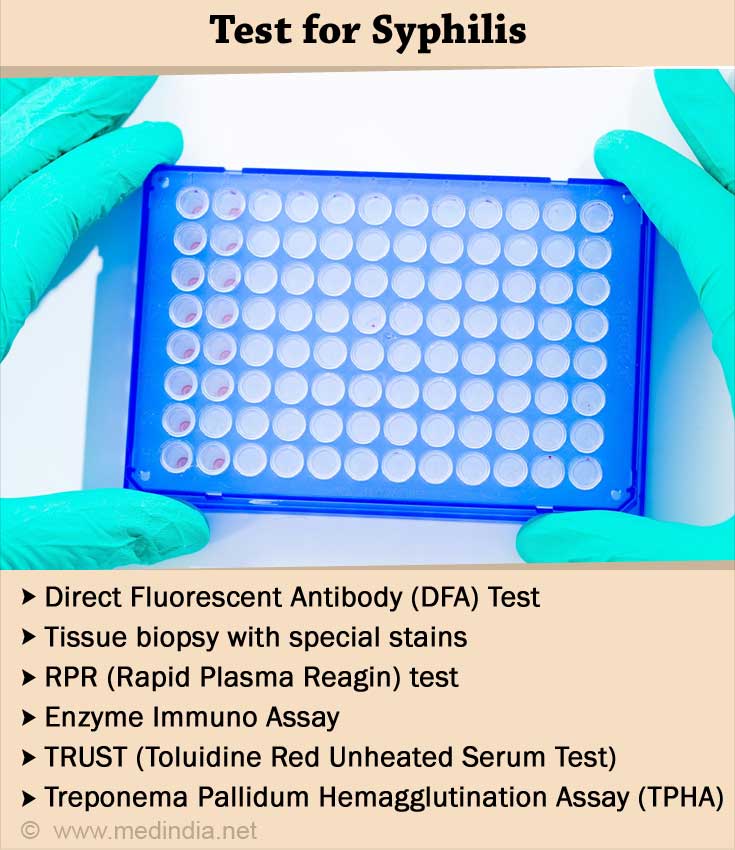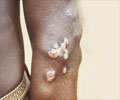- Screening for Syphilis Infection: Recommendation Statement - (http://www.aafp.org/afp/2004/1115/p1959.html)
- Diagnostic tools for preventing and managing maternal and congenital syphilis: an overview - (http://www.scielosp.org/scielo.php?script=sci_arttext&pid=s0042-96862004000600010&lng=en.)
- The laboratory diagnosis of syphilis - (http://www.ncbi.nlm.nih.gov/pmc/articles/pmc2095002)
- Syphilis - CDC Fact Sheet (Detailed) - (http://www.cdc.gov/std/syphilis/stdfact-syphilis-detailed.htm)
What is Syphilis?
Syphilis is a sexually transmitted disease caused by the bacterium Treponema Pallidum. It affects sexually active people of both genders. Syphilis manifests in various regions of the body, in many different ways, because of which it is called “the great pretender”. The varied clinical presentations may require multiple laboratory investigations before the diagnosis is clear. Test results and physical exam findings must be interpreted by the doctor with reference to the patient’s history.
How does Syphilis Present?
Syphilis presents in four stages:
- Primary syphilis: It manifests as an ulcer or a “sore” on the genitalia, called a chancre. This is usually a raised or ulcerated area on the genitals which is painless. There may be fluid oozing from the ulcer.
- Secondary syphilis: If it is not treated in the primary stage, the bacteria spread through the body and the affected person develops secondary syphilis. It may cause rashes, warts, tiredness, fever, joint pains and swollen lymph nodes.
- Latent syphilis: This is a stage where the bacteria “hides” in the body after the symptoms of secondary syphilis resolve. Affected individuals may have no symptoms at all, and may think that the disease has been cured. If it is not diagnosed and treated at this stage, the bacteria start attacking the tissues, and the disease progresses to the tertiary stage. Latent syphilis has been subdivided into early and late stages.
- Tertiary syphilis: Tertiary syphilis manifests very late in the course of the disease, sometimes even 50 years after the initial infection. It may present with multiple soft tumour like growths in various areas of the body, called “gummae”. It can also involve the brain, called neurosyphilis or it may involve the heart and the major blood vessels.
Mode of Spread
The most common mode of acquiring syphilis is though unprotected intercourse with a person who has an open syphilitic chancre. It is not passed through objects that a person with syphilis has used. Syphilis can very rarely be spread through blood transfusion. Pregnant mothers who are infected may pass the disease to their children, which produces what is called congenital syphilis.

How do you Test for Syphilis?
There are three basic types of tests for syphilis.
- Direct demonstration of Treponema pallidum
- Direct Fluorescent Antibody (DFA) Test
- Tissue biopsy with special stains

- Nucleic Acid Amplification Tests (Polymerase Chain Reaction or “PCR”)
- Nonspecific serological tests (Nontreponemal tests)
- RPR (Rapid Plasma Reagin) test
- USR test (Unheated Serum Reagin)
- TRUST (Toluidine Red Unheated Serum Test)
- Specific serological tests for Treponema pallidum (Treponemal tests)
- Enzyme Immuno Assay
- IgM – for early infection
- IgG – becomes positive at 5 weeks
- It is the preferred test for screening
- Treponema Pallidum Hemagglutination Assay (TPHA)
- Treponema Pallidum Particle Agglutination assay (TPPA)
- Fluorescent Treponemal antibody absorbed test (FTA-abs)
- Treponema Pallidum Chemiluminescent Assay
- Treponema pallidum recombinant antigen line immunoassay.
Who should undergo Screening?
Doctors may ask for a screening test in any person with symptoms and signs of syphilis.
- The US Preventive Services Task Force recommends screening for syphilis in:
- Populations who are at risk: commercial sex workers, men who have sex with men, people in adult correctional facilities and those who exchange sex for drugs.
- Pregnant women: At the time of diagnosis of pregnancy, and during the third trimester if the woman is from a population at risk.
- The CDC also recommends screening in:
- People who describe sexual activities that place them at a higher risk (unprotected intercourse, multiple sexual partners etc.)
- People who have partners who have tested positive
- Those who are sexually active and live in areas that have a higher prevalence of syphilis
- Theoretically, any of the nonspecific or specific tests can be used for screening.
- Traditionally, the VDRL and RPR were used as screening tests, and if positive, they were confirmed by either the specific tests or the direct tests.
- Now, because they are not so accurate, they have been replaced by the EIA method for screening. Both IgM and IgG EIA are done.
- Direct tests
- The direct tests are the most specific tests, and are definitive confirmatory tests.
- The direct tests are most useful during the primary and secondary stages, where affected tissues can be taken for biopsy.
- Specific treponemal tests
- These tests can be used during any stage of the disease, and should be done if screening with a nontreponemal test (VDRL or RPR) is positive.
- Nontreponemal tests
- These tests are used to screen for syphilis, and also to monitor the disease activity and response to treatment.
- Neurosyphilis
- A lumbar puncture should be done and CSF should be drained for analysis
- CSF-FTA-ABS is done to exclude neurosyphilis
- CSF-VDRL is done to confirm the disease.
- Congenital syphilis
- All infants born to mothers who have reactive syphilis tests should be evaluated for congenital syphilis.
- A combination of direct tests and treponemal tests is required to diagnose congenital syphilis.

What Tests are used for Screening?

During early stages of primary stage, the IgM antibodies are the first to appear. IgG antibodies reach maximum levels during the secondary stage. During pregnancy, IgG antibodies are checked.








